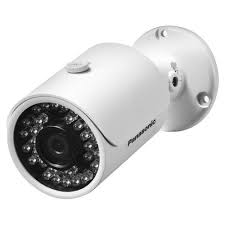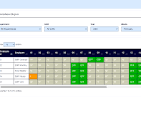CCTV Surveillance Cameras: Enhancing Security and Peace of Mind
In today’s fast-paced world, security is a top concern for individuals and businesses alike. With the rise in criminal activities and security threats, it has become essential to invest in reliable surveillance systems that can provide round-the-clock monitoring and deter potential wrongdoers. One such technology that has gained immense popularity is Closed Circuit Television (CCTV) surveillance cameras.
CCTV surveillance cameras offer a wide range of benefits, making them an indispensable tool for ensuring safety and security. Let’s explore some key advantages of installing CCTV cameras:
- Crime Prevention: The presence of CCTV cameras acts as a powerful deterrent against criminal activities such as theft, vandalism, and burglary. Potential wrongdoers are less likely to target an area or premises that are under constant surveillance.
- Monitoring and Surveillance: CCTV cameras provide real-time monitoring of activities in both indoor and outdoor spaces. This allows property owners or security personnel to keep a watchful eye on vulnerable areas, ensuring immediate response to any suspicious behavior or incidents.
- Evidence Collection: In the unfortunate event of a crime occurring, CCTV footage serves as valuable evidence for investigations and legal proceedings. High-quality camera recordings capture crucial details like facial features or license plate numbers that can aid law enforcement agencies in identifying culprits.
- Remote Monitoring: Modern CCTV systems offer the convenience of remote monitoring through mobile devices or computers connected to the internet. This enables users to keep an eye on their properties even when they are away, providing peace of mind and allowing for swift action if any untoward incident occurs.
- Employee Productivity: CCTV cameras installed in workplaces can help improve employee productivity by discouraging time theft, unauthorized breaks, or other unproductive behaviors. It also promotes adherence to company policies and ensures a safer work environment.
- Safety Enhancement: CCTV cameras play a vital role in enhancing safety within public spaces such as shopping malls, parking lots, and transportation hubs. They can help detect and prevent accidents, monitor crowd movement, and identify potential hazards in real-time.
- Cost-Effective Solution: Investing in a CCTV surveillance system is a cost-effective security measure in the long run. The initial installation costs are offset by the potential savings from preventing losses due to theft, vandalism, or fraudulent claims.
It is important to choose the right CCTV cameras based on specific requirements and objectives. Factors such as camera resolution, coverage area, night vision capability, weather resistance, and storage options should be considered while selecting a system.
At Sonal Enterprises India, we offer a wide range of high-quality CCTV surveillance cameras that cater to diverse security needs. Our expert team ensures professional installation and provides comprehensive support to ensure optimal performance.
Remember, investing in CCTV surveillance cameras is an investment in safety and peace of mind. Stay ahead of potential threats with advanced technology that keeps you protected 24/7.
Commonly Asked Questions About CCTV Surveillance Cameras
- What is a CCTV camera used for?
- What are the 4 types of CCTV cameras?
- What is the difference between CCTV and surveillance camera?
- Which CCTV cameras are best?
What is a CCTV camera used for?
A CCTV camera, also known as a closed-circuit television camera, is used for surveillance and security purposes. It is a video monitoring system that captures and records activities in both indoor and outdoor areas. Here are some common uses of CCTV cameras:
- Crime Prevention: CCTV cameras act as a visible deterrent to potential criminals, discouraging theft, vandalism, and other criminal activities. The presence of cameras can make individuals think twice before engaging in illegal behavior.
- Surveillance and Monitoring: CCTV cameras allow for real-time monitoring of activities in various locations such as homes, offices, retail stores, banks, public areas, and transportation hubs. They provide continuous surveillance to ensure the safety of people and property.
- Evidence Collection: In the event of a crime or incident occurring, CCTV footage serves as valuable evidence for investigations and legal proceedings. The recorded video can help identify suspects, establish timelines, and provide crucial details to law enforcement agencies.
- Employee Monitoring: Many businesses use CCTV cameras to monitor employee behavior and productivity within the workplace. It helps ensure adherence to company policies, prevent theft or misconduct, and maintain a safe working environment.
- Traffic Monitoring: CCTV cameras are commonly used for traffic management purposes. They assist in monitoring traffic flow, detecting accidents or congestion points, enforcing traffic rules through automated systems (such as red-light cameras), and enhancing overall road safety.
- Crowd Control: In crowded places like stadiums, concert venues, or public gatherings, CCTV cameras aid in crowd management by monitoring crowd movements and identifying potential security threats or incidents.
- Remote Monitoring: With advancements in technology, many CCTV systems now offer remote monitoring capabilities. Users can access live feeds or recorded footage remotely through smartphones or computers connected to the internet. This allows for real-time monitoring even when physically away from the premises.
- Safety Enhancement: CCTV cameras contribute to enhancing safety within public spaces by detecting potential hazards such as fires or accidents. They help authorities respond quickly to emergencies and ensure the well-being of individuals within those areas.
Overall, CCTV cameras are used to provide surveillance, deter criminal activities, monitor activities in real-time, collect evidence, and enhance safety and security in various settings.
What are the 4 types of CCTV cameras?
There are several types of CCTV cameras available in the market, each designed for specific surveillance needs. Here are four common types:
- Dome Cameras: Dome cameras are named after their dome-shaped design. They are versatile and suitable for both indoor and outdoor use. Their compact size makes them less noticeable, which can act as a deterrent to potential wrongdoers. Dome cameras often have a wide viewing angle, allowing for comprehensive coverage of an area.
- Bullet Cameras: Bullet cameras are cylindrical in shape and typically used for outdoor surveillance. They are known for their long-range capabilities and ability to capture high-resolution images even in low-light conditions. Bullet cameras usually have a fixed lens, making them ideal for monitoring specific areas such as entrances, parking lots, or perimeters.
- PTZ Cameras: PTZ (Pan-Tilt-Zoom) cameras offer flexibility and control over the surveillance area. These cameras can pan horizontally, tilt vertically, and zoom in or out as needed. PTZ cameras are commonly used in large outdoor spaces where there is a need to monitor different areas or track moving objects.
- C-mount Cameras: C-mount cameras have detachable lenses that allow users to customize the camera’s field of view according to their requirements. These cameras can support specialized lenses such as telephoto lenses for long-distance monitoring or wide-angle lenses for capturing a broader area.
It’s important to note that these are just a few examples of CCTV camera types available in the market, and there may be other variations depending on specific functionalities and features required for different surveillance applications.
What is the difference between CCTV and surveillance camera?
CCTV and surveillance cameras are often used interchangeably, but there is a subtle difference between the two terms.
CCTV (Closed Circuit Television) refers to a system of cameras and monitors that are connected in a closed circuit. The video footage captured by CCTV cameras is typically monitored and recorded on-site or within a limited network. The term “closed circuit” means that the video signals are transmitted to specific monitors or recording devices, which are not accessible to the public. The primary purpose of CCTV systems is to monitor and secure specific areas or premises.
On the other hand, surveillance cameras encompass a broader category of cameras used for monitoring and recording activities in various settings. Surveillance cameras can include not only CCTV cameras but also other types such as IP (Internet Protocol) cameras, wireless cameras, dome cameras, bullet cameras, and hidden or covert cameras. These cameras may be part of a larger surveillance system that utilizes advanced technologies like cloud storage, remote access, motion detection, or facial recognition.
In summary, while CCTV specifically refers to a closed circuit system with dedicated monitors and recording devices, surveillance camera is a more general term that encompasses various types of cameras used for monitoring and recording activities in different contexts.
Which CCTV cameras are best?
Choosing the best CCTV cameras depends on various factors, including your specific needs and requirements. Here are a few popular types of CCTV cameras that are known for their performance and features:
- Dome Cameras: Dome cameras are versatile and suitable for both indoor and outdoor use. They have a compact design and provide a wide field of view, making them ideal for monitoring large areas. Dome cameras are also tamper-resistant due to their dome-shaped housing.
- Bullet Cameras: Bullet cameras are long and cylindrical in shape, making them highly visible and acting as a deterrent to potential intruders. They are typically weatherproof and have infrared capabilities for night vision. Bullet cameras are commonly used for outdoor surveillance due to their durability.
- PTZ Cameras: PTZ (Pan-Tilt-Zoom) cameras offer flexibility in terms of camera movement and zoom capabilities. They can pan horizontally, tilt vertically, and zoom in or out to capture detailed images over large areas. PTZ cameras are often used in areas that require active monitoring or tracking.
- Thermal Cameras: Thermal cameras use heat signatures to detect objects or individuals, making them effective even in complete darkness or challenging weather conditions. These cameras can be useful for perimeter security, detecting intrusions, or monitoring temperature changes.
- IP Cameras: IP (Internet Protocol) cameras provide high-resolution video footage and offer advanced features such as remote access via the internet, motion detection, and easy integration with other security systems. IP cameras can be wired or wireless, providing flexibility in installation options.
- Day/Night Cameras: Day/Night cameras are designed to capture clear images both during daylight hours and in low-light conditions using infrared technology. These cameras automatically switch between color mode during the day and black-and-white mode with infrared illumination at night.
When selecting CCTV cameras, consider factors such as resolution (higher resolution provides clearer images), camera sensitivity (for better performance in low-light conditions), storage capacity, and compatibility with your existing security infrastructure.
It is recommended to consult with a professional security provider who can assess your specific needs and recommend the best CCTV cameras suitable for your requirements.




Wow, superb blog structure! How long have you been running a blog
for? you make blogging glance easy. The whole look of your web site is great,
as neatly as the content material! You can see similar here
sklep online
Thank you for your positive feedback! We’re glad you enjoyed the blog article about CCTV surveillance cameras. If you have any questions or need further information about CCTV systems, feel free to reach out. Your interest in enhancing security and peace of mind is appreciated.